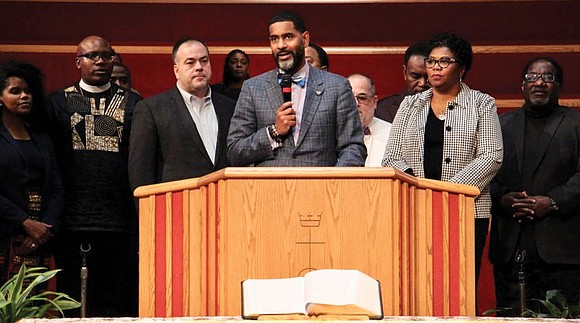Chicago churches join growing movement of congregations paying off medical debt
Religion News Service | 10/31/2019, 6 p.m.

This Thanksgiving, 5,888 families in Cook County, Ill., will receive a card with the names of several congregations belonging to different Protestant Christian denominations throughout the city of Chicago and these words: “Have a wonderful Thanksgiving. We want you to know that all your debts have been forgiven.”
The churches don’t mean that merely theologically.
Together, the congregations paid off $5.3 million in medical debt for “the poorest of the poor” — many in Chicago’s South Side neighborhoods of Englewood, Auburn Gresham, Washington Heights, Roseland and West Pullman, according to the Rev. Otis Moss III, senior pastor of the historic Trinity United Church of Christ.
Trinity UCC, a congregation of 8,500 founded in 1961 in Washington Heights, is the first African-American church in the UCC and counts former President Obama among its past members.
“We believe this is a moment of Jubilee for our community — a moment of Jubilee for our nation, where we reset the moral compass of our nation and for some of our churches that have lost their way in reference to the waves and the undertow of our current political situation in this nation,” Rev. Moss said at a celebration Oct. 20 announcing the churches’ donation.
The pastor said the idea came several months ago from a conversation he had with the Rev. Traci Blackmon of the UCC. The two were discussing how they could engage their communities and “plotting some holy mischief”
when the conversation turned to an article in The New York Times about a nonprofit called RIP Medical Debt.
“I thought, ‘What an incredible program!’ Instead of allowing debt collectors to purchase the debt, why not have communities of faith purchase that debt and forgive that debt?” Rev. Moss said.
For every dollar Chicago churches donated, RIP Medical Debt was able to purchase and abolish about $142 worth of debt, according to Rev. Blackmon, the UCC’s associate general minister of justice and local church ministries. The average amount of debt they “forgave” was $970, she said, which cost the churches just $7, allowing their donations of $38,000 to cancel more than $5 million of debt.
“I’m glad that we could do it. But there’s absolutely no reason why people should be held hostage so that other people can be enriched on their backs,” Rev. Blackmon said.
The Chicago churches join a growing trend of congregations paying off medical debt for the people in their communities and beyond. At least 18 other churches have done the same from the start of 2018 to the end of May, forgiving $34.4 million in debt through RIP Medical Debt. Even comedian John Oliver paid off nearly $15 million in medical debt through the non-profit in an episode of his HBO show “Last Week Tonight” (though not on behalf of the satiric televangelism ministry he also started for another episode of the show, Our Lady of Perpetual Exemption).
Joe Antos, a health care policy scholar for the conservative American Enterprise Institute, raised red flags for congregations wanting to pay off medical debt for their members earlier this year in an article in Christianity Today.
They are “well-meaning,” but, Mr. Antos told Religion News Service, “Generally churches do not have expertise in health financing.”
RIP Medical Debt co-founders Craig Antico and Jerry Ashton do. Both had worked in debt collections for years until realizing who was impacted and how “destructive” it was for them, Mr. Antico said.
“It became abundantly clear: Why don’t we do what we did with our business life and just do it for good?” Mr. Antico said.
RIP Medical Debt, which was founded in 2014, purchases “portfolios” of medical debt from health care providers and from the secondary debt market at an average $1 for $100 of medical debt, according to its website.
Those providers sell the debt at pennies on the dollar to try to recoup some of the cost of those unpaid bills. Usually, those who buy that debt then continue to bill people for it.
RIP Medical Debt instead abolishes the debt, with no tax consequences or strings attached for the recipients, according to its site.
The New York-based nonprofit brought in just $3,000 in its first year, according to Mr. Antico. But donations exploded after RIP Medical Debt appeared on “Last Week Tonight,” he said. It quickly raised $250,000, and donations have continued to grow since then.
Mr. Antico said he expects the nonprofit to raise $10 million this year and cross $1 billion total forgiven in a matter of weeks — the goal it set when it started, he said.
Churches have played a huge role in that growth, according to the co-founder. RIP Medical Debt worked with more than 70 faith-based groups this year alone, according to the Chicago Tribune.
“It’s nonpartisan or non-political, and Republicans, Democrats, progressives can all agree on this,” Mr. Antico said.
“And churches — they all agree that their mission is to help their people get through hard times and be resilient and let people start over again and know that they’re supported. I think that’s the key here. They care so much about people and their community and that’s why it’s resonating.”
UCC churches across the country will make medical debt relief the focus of their Giving Tuesday campaigns on Tuesday, Dec. 3, Rev. Blackmon announced.
“This is not the end. This is the beginning. We are using this as a sacred launching pad in the United Church of Christ,” she said.






